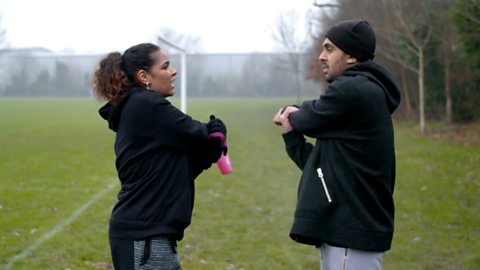Getting the right tone
Watch the video to find out more.
Speaker 1: We need to change how we speak depending on the situation and who we're speaking to.
When we don't know people very well we need to use more formal language.
Speaker 2: (TO OTHER PEOPLE) Helen Thompson?
Doctor Campbell is still with another patient.
SheÔÇÖll be with you as soon as she possibly can.
Speaker 1: (TO AUDIENCE) IÔÇÖm a patient here and we donÔÇÖt know each other so the receptionist talks to me in a formal way.
(TO OTHER PEOPLE) Thank you. I appreciate you letting me know.
(TO AUDIENCE) And I need to respond in a similar manner.
But with people you know well, you can be more informal.
(PHONE RINGS) My best friend.
Speaker 3: (ON PHONE) Where are you?
IÔÇÖm sitting here all on my own! Are we still on for lunch?
Speaker 1: (TO AUDIENCE) This gives me the go-ahead to be more informal.
Chatty. And the language I use to apologise can be more informal too.
(TO PERSON ON PHONE) Yeah, soz, IÔÇÖm stuck at the doctorÔÇÖs.
Speaker 4: Helen Thompson?
Speaker 1: (TO PERSON ON PHONE) IÔÇÖll see you tomorrow, right?
Speaker 4: IÔÇÖd rather see you now.
(SPEAKER 1 INDICATES PHONE)
Speaker 1: Sorry.
Speaker 4: Please, follow me.
Is it formal?
Test your knowledge with this activity.
The language around us
Watch the video to find out more.
Speaker: Every day weÔÇÖre all reading lots of words all around us.
And everything we read is using a different kind of language.
(SPEAKER SEES NOTICE IN SHOP WINDOW)
Some language is formal. And some language is informal.
(SPEAKER SEES CHALK BOARD OUTSIDE CAFE)
This leaflet about opening a bank account uses formal language and a polite tone.
(PHONE BEEPS) This email is inviting me to a job interview, so it is structured and has perfect spelling.
And because the company doesnÔÇÖt know me, the writer uses formal language.
So, for example, they donÔÇÖt abbreviate words or use contractions.
'We would like to invite you,' they say. Rather than 'weÔÇÖd like'.
(PHONE BEEPS) But when we know people well, we use informal language like this: 'Hiya, want to hang out tonite?' which is far more chatty.
We use abbreviations, contractions, slang. When weÔÇÖre sending texts, we sometimes even misspell things like tonight or use numbers instead of letters.
Understanding the difference between informal and formal language is not just about knowing which language to use, itÔÇÖs also about choosing the right language in a situation.
And we can learn a lot just by reading, listening and noticing the language all around us, every day.
Find the right tone
Test your knowledge with this activity.
Find the right style
Watch the video to find out more.
Speaker: Dear Mr Webber, I saw your advertisement for the post of sports assistant.
I feel Im well qualified for the role and would like to ask you
(PHONE VIBRATES) Hiya, you free tonight?
To be honest, Im really Tbh Im super busy.
(TO AUDIENCE) Here IÔÇÖm writing an email applying for a job so IÔÇÖm using formal, polite language.
(PHONE VIBRATES) (TO THEMSELVES) No worries.
(TO AUDIENCE) Over here IÔÇÖm texting, so I can be chatty, because I donÔÇÖt want to be formal with my friends.
I can use abbreviations like 'def' instead of 'definitely' and contractions like 'donÔÇÖt', the shortening of 'do not'.
(TO THEMSELVES) OK so 'Dear sir/madam' needs a 'Yours faithfully', so 'Dear Mr Webber' needs 'Yours sincerely'. Oops, (TO AUDIENCE) wrong message.
IÔÇÖm still being me in both these messages but IÔÇÖm just adapting my style and choice of words.
OK, this is ready to go.
(TO THEMSELVES) LOL. (TO AUDIENCE) Almost did it again.
This is why, whether youÔÇÖre being informal or formal, re-reading before you hit send is so important.
So is just writing one thing at a time.
Know your letter layout
Test your knowledge with this activity.
More on Learn the basics
Find out more by working through a topic
- count7 of 10
